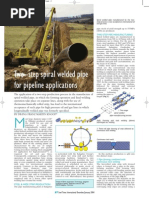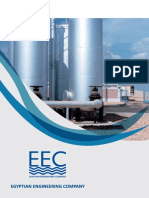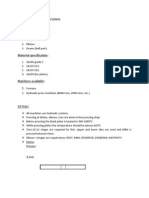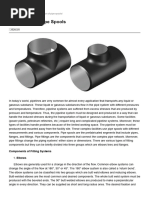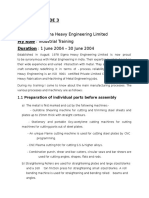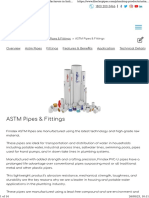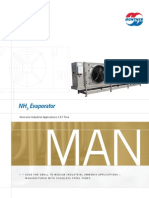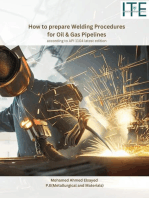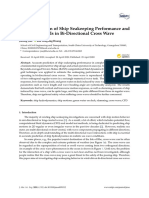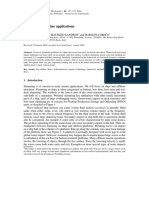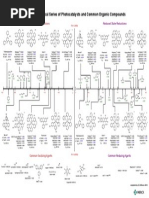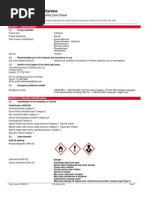0 ratings0% found this document useful (0 votes)
36 viewsShop 49 - Pipe Shop
Shop 49 - Pipe Shop
Uploaded by
Sahil JawaThe pipe shop contains various machinery to cut, bend, bevel, and thread pipes. This includes a band saw to cut pipes from 15NB to 200NB, a bending machine for pipes from 15NB to 40NB, and 6 bevelling machines for edge preparation of pipes from 40NB to 150NB. Pipes are cut and fabricated into spools according to design drawings, then bent, edge prepped, tack welded, and tested before being sent for treatment and installation. The band saw uses water and chemicals for cooling when cutting pipes up to 250NB in diameter.
Copyright:
© All Rights Reserved
Available Formats
Download as DOCX, PDF, TXT or read online from Scribd
Shop 49 - Pipe Shop
Shop 49 - Pipe Shop
Uploaded by
Sahil Jawa0 ratings0% found this document useful (0 votes)
36 views3 pagesThe pipe shop contains various machinery to cut, bend, bevel, and thread pipes. This includes a band saw to cut pipes from 15NB to 200NB, a bending machine for pipes from 15NB to 40NB, and 6 bevelling machines for edge preparation of pipes from 40NB to 150NB. Pipes are cut and fabricated into spools according to design drawings, then bent, edge prepped, tack welded, and tested before being sent for treatment and installation. The band saw uses water and chemicals for cooling when cutting pipes up to 250NB in diameter.
Original Description:
PIPING
Original Title
Piping
Copyright
© © All Rights Reserved
Available Formats
DOCX, PDF, TXT or read online from Scribd
Share this document
Did you find this document useful?
Is this content inappropriate?
The pipe shop contains various machinery to cut, bend, bevel, and thread pipes. This includes a band saw to cut pipes from 15NB to 200NB, a bending machine for pipes from 15NB to 40NB, and 6 bevelling machines for edge preparation of pipes from 40NB to 150NB. Pipes are cut and fabricated into spools according to design drawings, then bent, edge prepped, tack welded, and tested before being sent for treatment and installation. The band saw uses water and chemicals for cooling when cutting pipes up to 250NB in diameter.
Copyright:
© All Rights Reserved
Available Formats
Download as DOCX, PDF, TXT or read online from Scribd
Download as docx, pdf, or txt
0 ratings0% found this document useful (0 votes)
36 views3 pagesShop 49 - Pipe Shop
Shop 49 - Pipe Shop
Uploaded by
Sahil JawaThe pipe shop contains various machinery to cut, bend, bevel, and thread pipes. This includes a band saw to cut pipes from 15NB to 200NB, a bending machine for pipes from 15NB to 40NB, and 6 bevelling machines for edge preparation of pipes from 40NB to 150NB. Pipes are cut and fabricated into spools according to design drawings, then bent, edge prepped, tack welded, and tested before being sent for treatment and installation. The band saw uses water and chemicals for cooling when cutting pipes up to 250NB in diameter.
Copyright:
© All Rights Reserved
Available Formats
Download as DOCX, PDF, TXT or read online from Scribd
Download as docx, pdf, or txt
You are on page 1of 3
Shop 49 - Pipe Shop
Pipe shop capabilities
1. 1 EOT CRANES
CAPACITY:- 5 Ton TYPE:- single girder EOT crane Crane approachable area :
– 100*20m
2. BAND SAW MACHINE ( cutting pipe )
CAPACITY:-15NB TO 200NB Area require:- 6*3m
3. Bending machine
CAPACITY:- 15NB to 40NB Area require:- 6*3m
4. 6 BEVELLING MACHINE ( edge preparation , side to side connection )
CAPACITY:- 40NB Sch 80 to 150NB sch 80 Area require:- 1M / MACHINE
5. AIR COMPRESSOR ( pressure test )
RECEIVER:- 100 Ltrs Max. working pressure:- 12Kg/cm2 Area require:-
3*2m
6. THREAD MACHINE
CAPACITY:- ½ inch to 4 inch Thread type:- pipe external thread Area:-
1.5*1.5m
7. LATHE MACHINE
Lathe bed size:- 12 feet swing HD : 250 Pipe dia can handle:- 15NB TO
250NB
Pipe length can handle:- 250mm max type of operation:- Turning/ Facing / V
cut and External threading Area:- 15 feet / 6 feet
A ship's machinery space contains hundreds of metres of piping and fittings.
The various systems are arranged to carry many different liquids at various
temperatures and pressures. The influences of operational and safety
requirements, as well as legislation, result in somewhat complicated
arrangements of what are a few basic fittings. Valves, strainers, branch pipes,
etc., are examples of fittings which are found in a pipe system.
Spooling
Piping account up to 23% of cost of material and is therefore a major
component.
Pipes and all elbow joints are purchased form external vendors based on
requirements.
Cu-Ni and other steel pipes are stored separately to avoid chemical
reactions.
Piping account up to 23% of cost of material and is therefore a major
component.
Pipes and all elbow joints are purchased form external vendors based on
requirements. Cu-Ni and other steel pipes are stored separately to avoid
chemical reactions.
Referring to the design drawings, pipes (called spools) are cut into the
required sizes. A band saw machine is used to cut these spools. A
coolant continuously flows on the spool at the location it is being cut to
prevent heating during the cutting process. A plasma cutting machine is
also available for cutting the spools.
Spools are bent based on requirement. The bending is done by a
machine while the angle of bend required is set by an operator
manually.
Edge preparation is then done i.e. a bevel cut is given at the end of the
pipe wherever required. These pipes are initially tack welded to keep
them aligned and intact before final welding is done. Pipe coupling is
done with a flange or a sleeve in general.
After the spools have been fabricated, and flanges welded, radiography
test is done to check for weld defects. Visual test is also done by the
quality control team and small lengths are subjected to hydro pressure
test with the test pressure being 1.5 times the operation pressure.
Upon completion of all these tests, the pipes are sent for treatment like
galvanization outside the shipyard.
After treatment, the pipes are sent to the palletisation yard where they
are stored. These pipes are then installed during the pre-outfitting stage
and later stages of production.
Band saw machine
To cut pipes of small diameter. Up to 250 NB for mild steel
Uses water and chemical as cooling material. Shared-B water
The blade material used is ASTM A106.
Pipe bending machine
65 CNC3X - can be used be up to 180 degrees.
Plasma cutting
Pipes of diameter larger than 250 NB(nominal bore) of mild steel are cut
here.
Pneumatic controlled rollers are used to roll the pipe as it gets cut.
You might also like
- Saudi Aramco Piping QC Inspector Sample Interview QuestionsDocument6 pagesSaudi Aramco Piping QC Inspector Sample Interview QuestionsRichard Periyanayagam90% (10)
- Cold Cutting ProcedureDocument9 pagesCold Cutting ProcedureVăn PhúcNo ratings yet
- Piping NotesDocument11 pagesPiping NotesRavindra S. Jivani100% (1)
- Before The FloodDocument6 pagesBefore The FloodBhavya Sethi100% (1)
- Two Step Spiral Pipe ManufacturingDocument4 pagesTwo Step Spiral Pipe ManufacturingEagle Spirit50% (2)
- EEC Cat PDFDocument28 pagesEEC Cat PDFNermeen ElmelegaeNo ratings yet
- Coiled Tubing Operations at a Glance: What Do You Know About Coiled Tubing Operations!From EverandCoiled Tubing Operations at a Glance: What Do You Know About Coiled Tubing Operations!Rating: 5 out of 5 stars5/5 (2)
- Legionaires's Disese - Case StudyDocument81 pagesLegionaires's Disese - Case StudyEliza Spark100% (1)
- Reported Speech PDFDocument6 pagesReported Speech PDFFiore Al-WardNo ratings yet
- Press Shop: Operations PerformedDocument15 pagesPress Shop: Operations PerformedRohit KumarNo ratings yet
- Process Piping & Piping FittingsDocument16 pagesProcess Piping & Piping FittingsJaveed A. Khan100% (3)
- Piping TheoryDocument20 pagesPiping Theorysonud4u100% (5)
- Pipe WorkDocument12 pagesPipe WorkSudheepNo ratings yet
- Fabrication of Pipe SpoolsDocument5 pagesFabrication of Pipe Spoolsafay1945No ratings yet
- Irrigation Equipment and Jointing TechniquesDocument16 pagesIrrigation Equipment and Jointing TechniquesKiyyaa OromooNo ratings yet
- Piping QuestionsDocument13 pagesPiping QuestionsMani Kanta100% (1)
- Pipe FittingsDocument16 pagesPipe FittingsHammad100% (1)
- Qa QC NotesDocument8 pagesQa QC NotesFiroz AlamNo ratings yet
- General - CH10 - Fluid Lines & FittingDocument70 pagesGeneral - CH10 - Fluid Lines & Fittingali amr0% (1)
- Manufacturing Process: Black PipeDocument2 pagesManufacturing Process: Black PipeDhanraj PatilNo ratings yet
- Unit 1 Fundamentals of PipingDocument15 pagesUnit 1 Fundamentals of PipingAkshat ChauhanNo ratings yet
- Piping: Wing Union ConnectionsDocument8 pagesPiping: Wing Union ConnectionsMahmoud Ahmed Ali AbdelrazikNo ratings yet
- 3D & 5D Pipe Bend For PipelineDocument6 pages3D & 5D Pipe Bend For PipelinemohammadazraiNo ratings yet
- Dies For Pipe Extrusion Line - Pipe Extrusion LinesDocument4 pagesDies For Pipe Extrusion Line - Pipe Extrusion LinesWerner SchrammelNo ratings yet
- MechanicalDocument173 pagesMechanicalKerx Endrano100% (1)
- 634515782532305000Document137 pages634515782532305000Norisk NanungNo ratings yet
- Career Episode 3: Preparation of Individual Parts Before AssemblyDocument8 pagesCareer Episode 3: Preparation of Individual Parts Before AssemblyHarmeetNo ratings yet
- C-31-Rubber Lined Piping System PDFDocument6 pagesC-31-Rubber Lined Piping System PDFvedadonNo ratings yet
- Saudi Aramco Piping QC Inspector Sample Interview Questions & Answers..Document5 pagesSaudi Aramco Piping QC Inspector Sample Interview Questions & Answers..Ch SIB100% (1)
- OneSteel Steel Pipe Final LoResDocument24 pagesOneSteel Steel Pipe Final LoResAgus Budi PrasetyoNo ratings yet
- Machines For The Production of Bi-Metallic Clad Pipes - Their Application and Manufacturing MethodsDocument21 pagesMachines For The Production of Bi-Metallic Clad Pipes - Their Application and Manufacturing Methodsprofesor_No ratings yet
- ME 27 Lecture 03Document57 pagesME 27 Lecture 03VEGA DARRENNo ratings yet
- Presentation On Pipes.: GET's EPCM Piping DepartmentDocument37 pagesPresentation On Pipes.: GET's EPCM Piping DepartmentDeepak Shetty50% (2)
- Study of Carbon Steel Pipes 2013Document26 pagesStudy of Carbon Steel Pipes 2013Deepak Ramchandani100% (1)
- Hose&Braid Catalog FlexicraftDocument24 pagesHose&Braid Catalog Flexicraftkutts76No ratings yet
- ASTM Plumbing Pipes & Fittings Manufacturers in India Finolex PipesDocument14 pagesASTM Plumbing Pipes & Fittings Manufacturers in India Finolex PipesSREENATH SREEDHARANNo ratings yet
- ENTS 400 Rev5Document62 pagesENTS 400 Rev5Scherjeal Jangda100% (1)
- Piping ComponentsDocument39 pagesPiping Componentsbvenky991100% (1)
- What Exactly Is Rolling?Document39 pagesWhat Exactly Is Rolling?Ashish12312No ratings yet
- Inosindt U-Tubes 75Document6 pagesInosindt U-Tubes 75Babar Manzoor GhauriNo ratings yet
- DBR For PipingDocument50 pagesDBR For Pipingrajachem100% (1)
- Important Process Piping QuestionsDocument12 pagesImportant Process Piping Questionspratap biswas100% (1)
- Guntner MANDocument28 pagesGuntner MANJosé Luis Boncún Carnero100% (2)
- Technical SpecificationDocument8 pagesTechnical SpecificationSANKALP MNo ratings yet
- Petroleum Production Engineering-I: Third Year Second TermDocument46 pagesPetroleum Production Engineering-I: Third Year Second Termsarfraz hussain100% (1)
- Hot Tapping PDFDocument32 pagesHot Tapping PDFSreenivas Kamachi Chettiar100% (1)
- MEP InformationDocument6 pagesMEP Informationstephenhcc1No ratings yet
- Rubber LinedDocument6 pagesRubber LinedPrasanta Kumar Behera100% (1)
- Technical Details of Mandev Copper Tubes For Air conditioning and Refrigeration (1) (1)Document10 pagesTechnical Details of Mandev Copper Tubes For Air conditioning and Refrigeration (1) (1)manjithconquerNo ratings yet
- Plug Valves enDocument24 pagesPlug Valves enAtty AttyNo ratings yet
- A World of DifferenceDocument3 pagesA World of Differenceeastham35No ratings yet
- Pig TrapsDocument6 pagesPig TrapsDouGPhillips999100% (1)
- P StockDocument9 pagesP StockJoe Mari CapaNo ratings yet
- Aramco Interview QuestionsDocument38 pagesAramco Interview QuestionsMd Sharique86% (7)
- PIPE and TubesDocument11 pagesPIPE and TubesnamNo ratings yet
- Piping Components EbookDocument45 pagesPiping Components Ebooksrinivasanssc100% (3)
- Reinforcements 1.steel Reinforcement 1.1 Steel Reinforcement Products (Fabricated in Romania)Document21 pagesReinforcements 1.steel Reinforcement 1.1 Steel Reinforcement Products (Fabricated in Romania)Imola SzaszNo ratings yet
- Steam Line Mechanical DistributionDocument25 pagesSteam Line Mechanical DistributionNAYEEMNo ratings yet
- Machines, Tools and Methods of Automobile ManufactureFrom EverandMachines, Tools and Methods of Automobile ManufactureRating: 4 out of 5 stars4/5 (1)
- How to prepare Welding Procedures for Oil & Gas PipelinesFrom EverandHow to prepare Welding Procedures for Oil & Gas PipelinesRating: 5 out of 5 stars5/5 (1)
- Read About Bi-Diretional Cross WaveDocument24 pagesRead About Bi-Diretional Cross WaveSahil JawaNo ratings yet
- Simulation-Based Analysis of Ship Motions in ShortDocument21 pagesSimulation-Based Analysis of Ship Motions in ShortSahil JawaNo ratings yet
- ISOPE PPT Template-2022-Bio-Use-CcDocument1 pageISOPE PPT Template-2022-Bio-Use-CcSahil JawaNo ratings yet
- Wave Kinematics of Short-Crested WavesDocument6 pagesWave Kinematics of Short-Crested WavesSahil JawaNo ratings yet
- Energies 12 00785Document23 pagesEnergies 12 00785Sahil JawaNo ratings yet
- ANSYS Fluent Introduction Course Summary and Best Practice: Prepared By: Tomer AvrahamDocument28 pagesANSYS Fluent Introduction Course Summary and Best Practice: Prepared By: Tomer AvrahamSahil JawaNo ratings yet
- Preprints202007 0723 v1Document13 pagesPreprints202007 0723 v1Sahil JawaNo ratings yet
- Fully Three-Dimensional Ship Seakeeping Computations With A Surge-Corrected Rankine Panel MethodDocument8 pagesFully Three-Dimensional Ship Seakeeping Computations With A Surge-Corrected Rankine Panel MethodSahil JawaNo ratings yet
- CFD Investigation Into The Wave Added Resistance of Two ShipsDocument20 pagesCFD Investigation Into The Wave Added Resistance of Two ShipsSahil JawaNo ratings yet
- Ocean Engineering: Dong-Min Park, Jae-Hoon Lee, Yoo-Won Jung, Jaehoon Lee, Yonghwan Kim, Frederik GerhardtDocument14 pagesOcean Engineering: Dong-Min Park, Jae-Hoon Lee, Yoo-Won Jung, Jaehoon Lee, Yonghwan Kim, Frederik GerhardtSahil JawaNo ratings yet
- A Co-Operative Hybrid Model For Ship Motion Prediction: R. Skulstad G. Li T. I. Fossen T. Wang H. ZhangDocument10 pagesA Co-Operative Hybrid Model For Ship Motion Prediction: R. Skulstad G. Li T. I. Fossen T. Wang H. ZhangSahil JawaNo ratings yet
- Multi-Objective Hydrodynamic Optimization of The DTMB 5415 For Resistance and SeakeepingDocument18 pagesMulti-Objective Hydrodynamic Optimization of The DTMB 5415 For Resistance and SeakeepingSahil JawaNo ratings yet
- Processes: Study On Hull Optimization Process Considering Operational Efficiency in WavesDocument21 pagesProcesses: Study On Hull Optimization Process Considering Operational Efficiency in WavesSahil JawaNo ratings yet
- Tese Rafael WataiDocument263 pagesTese Rafael WataiSahil JawaNo ratings yet
- Chapter 5 - Seakeeping ModelsDocument44 pagesChapter 5 - Seakeeping ModelsSahil Jawa100% (1)
- 3d M TermDocument11 pages3d M TermSahil JawaNo ratings yet
- EN455CourseNotesAY20 Chapter3Document37 pagesEN455CourseNotesAY20 Chapter3Sahil JawaNo ratings yet
- Faltinsen2004 Article SlammingInMarineApplicationsDocument31 pagesFaltinsen2004 Article SlammingInMarineApplicationsSahil JawaNo ratings yet
- Research ArticleDocument27 pagesResearch ArticleSahil JawaNo ratings yet
- Short-Term Prediction in Vessel Heave Motion BasedDocument13 pagesShort-Term Prediction in Vessel Heave Motion BasedSahil JawaNo ratings yet
- 078 - S7 - Ole A. HermundstadDocument30 pages078 - S7 - Ole A. HermundstadSahil JawaNo ratings yet
- Efficient Methods For Direct Calculation of Slamming Loads On ShipsDocument21 pagesEfficient Methods For Direct Calculation of Slamming Loads On ShipsSahil JawaNo ratings yet
- Slamming of Ships: Where Are We Now?Document28 pagesSlamming of Ships: Where Are We Now?Sahil JawaNo ratings yet
- SeakeepingDocument38 pagesSeakeepingSahil JawaNo ratings yet
- FEMA Acronyms, Abbreviations, and Terms (FAAT) List 2005 PDFDocument160 pagesFEMA Acronyms, Abbreviations, and Terms (FAAT) List 2005 PDFlavrik100% (1)
- Candy LandDocument3 pagesCandy LandAyesha SirajNo ratings yet
- Cold StorageDocument39 pagesCold StorageIvan Fauzi Ryanto100% (1)
- Turning The TideDocument7 pagesTurning The TideRifky RifaldiNo ratings yet
- Preboard Exam (XII) Applied Math 23-24Document5 pagesPreboard Exam (XII) Applied Math 23-24prateektech949No ratings yet
- Misindia Cosamb (F)Document28 pagesMisindia Cosamb (F)Suman KumarNo ratings yet
- CertificateDocument15 pagesCertificateAbhishek AryaNo ratings yet
- Photocatalysts Chart DiRoccoDocument1 pagePhotocatalysts Chart DiRoccoDevin FergusonNo ratings yet
- Operation Manual Manual de Instrucciones: Compact Overlock MachineDocument74 pagesOperation Manual Manual de Instrucciones: Compact Overlock MachineBelen BarsantiNo ratings yet
- Andrew 4.6m C-Ku AntennaDocument2 pagesAndrew 4.6m C-Ku AntennaEng Simon Peter NsoziNo ratings yet
- Real Estate LawDocument17 pagesReal Estate LawKim Carlo F. Tangian100% (1)
- BADI To Default Values in PA Infotypes - SCNDocument6 pagesBADI To Default Values in PA Infotypes - SCNabhiNo ratings yet
- Tiguan Catalogue 2022 EN-specification-digitalDocument5 pagesTiguan Catalogue 2022 EN-specification-digitalJxjd HxjdNo ratings yet
- Correction of Errors BBA 43ADocument3 pagesCorrection of Errors BBA 43AAyesha Jamil 5099-FMS/BBA/F17No ratings yet
- 10 - Troubleshooting INSITE 6.4 OnDocument68 pages10 - Troubleshooting INSITE 6.4 OnagvassNo ratings yet
- Newmar DC-DC Converters Isolated IspDocument1 pageNewmar DC-DC Converters Isolated IspzeroseyaNo ratings yet
- SAED International Profile (ENGLISH)Document24 pagesSAED International Profile (ENGLISH)Mohammad BokhariNo ratings yet
- Practice 2: Protein Quantification Biochemistry Pharmaceutical IPNDocument12 pagesPractice 2: Protein Quantification Biochemistry Pharmaceutical IPNScribdTranslationsNo ratings yet
- Honors Advanced Calculus and Linear Algebra p7Document2 pagesHonors Advanced Calculus and Linear Algebra p7marchelo_cheloNo ratings yet
- Inclusive Engagement GuideDocument1 pageInclusive Engagement GuideRomy HidayatNo ratings yet
- LRMDS BrochureDocument2 pagesLRMDS BrochureJeremaih MallariNo ratings yet
- Prevention of Railway Accident Using Arduino Based Safety System A Case Study of Addis Ababa Light Rail Transit IJERTV8IS090091Document6 pagesPrevention of Railway Accident Using Arduino Based Safety System A Case Study of Addis Ababa Light Rail Transit IJERTV8IS090091Jebastin RohinNo ratings yet
- Training Report On Textile Wet ProcessingDocument38 pagesTraining Report On Textile Wet ProcessingMunazza SohailNo ratings yet
- First Speaking Test 1Document7 pagesFirst Speaking Test 1Carmen CastellóNo ratings yet
- Hoja de Seguridad Estireno InglesDocument10 pagesHoja de Seguridad Estireno InglesL.a. Landin RodriguezNo ratings yet
- 513200-Winch Calculation AftDocument3 pages513200-Winch Calculation Aftphankhoa83-1No ratings yet
- U.S. Coast Guard Auxiliary FC Robert ReczekDocument6 pagesU.S. Coast Guard Auxiliary FC Robert ReczekNicholas GaliardoNo ratings yet




